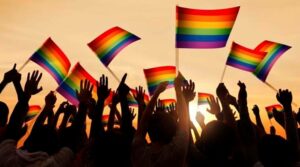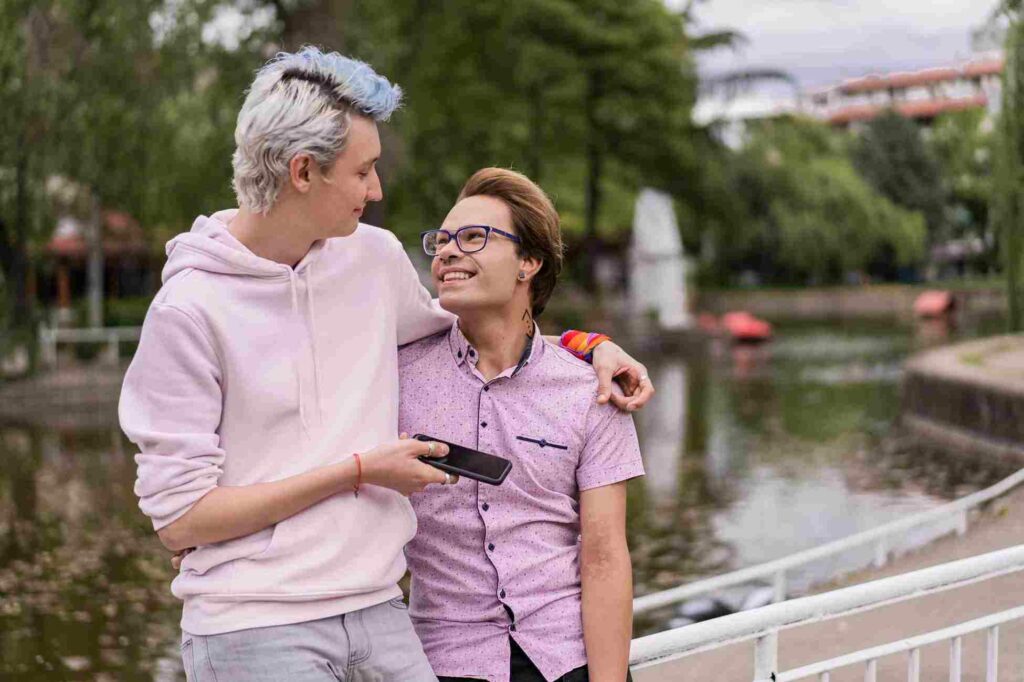This article aims to delve into the unique challenges encountered by bisexual individuals, and the role of bisexual counseling in fostering better mental health, self-acceptance, and overall well-being. Whether you identify as bisexual, are questioning your sexuality, or are a therapist seeking to better serve your bisexual clients, this guide provides a comprehensive understanding of bisexual counseling.
Contents
Challenges Faced By The Bisexual Community
 Bisexual individuals, like anyone under the LGBTQ+ umbrella, face a unique set of challenges due to their sexual orientation. Understanding these difficulties is key to fostering a supportive and empathetic environment. As well as providing effective counseling and therapy services.
Bisexual individuals, like anyone under the LGBTQ+ umbrella, face a unique set of challenges due to their sexual orientation. Understanding these difficulties is key to fostering a supportive and empathetic environment. As well as providing effective counseling and therapy services.
Here are some of the prominent challenges often encountered by the bisexual community:
- Bisexual Erasure of Invisibility
Bisexuality is often invalidated or dismissed by both heterosexual and homosexual communities. This phenomenon, known as bisexual erasure or invisibility, stems from the false belief that people can only be attracted to one gender. Bisexual individuals may feel overlooked, misunderstood, or excluded because their orientation is not recognized or taken seriously.
- Biphobia
Bisexual individuals face prejudice, fear, or hatred based on their sexual orientation, known as biphobia. This can include negative stereotypes, such as perceptions of promiscuity or indecisiveness. Biphobia can occur in various forms and settings, including personal relationships, at work, or in public.
- Mental Health Issues
The bisexual community faces high rates of mental health issues, including anxiety, depression, and suicidal ideation. These may stem from discrimination, social rejection, or internalized biphobia.
- Monosexism
This is the belief that people can only be attracted to one gender. And it devalues and denies the existence of bisexuality and other non-monosexual identities.
- Discrimination and Violence
Bisexual individuals are at a higher risk of facing discrimination, sexual violence, and intimate partner violence compared to their heterosexual or homosexual counterparts.
- Identity Struggles
Bisexual individuals often face struggles related to their identity. This can include confusion, stress over ‘coming out,’ or difficulty in accepting their orientation.
Addressing these challenges through bisexual-specific counseling and therapy. As well as broader societal change is essential for improving the lives and mental health of bisexual individuals.
Role of Bisexual Counseling in Mental Health
Here are some of the ways in which bisexual counseling benefits mental health:
1. Bisexual Identity
A primary role of bisexual counseling is to affirm the validity of the client’s bisexual identity. This helps to counteract the effects of bisexual erasure and invisibility, providing a safe space where the client’s sexual orientation is acknowledged and respected.
2. Supporting Mental Health
Bisexual individuals often face increased rates of mental health issues such as anxiety, depression, and suicidal ideation. Counseling provides a supportive environment where these concerns can be addressed, with therapists equipped to understand and navigate the intersection of bisexuality and mental health.
3. Navigating Relationships and Coming Out
Counseling can assist individuals in navigating complex issues around relationships, whether they’re with same-sex or different-sex partners. It also provides support around the often stressful process of ‘coming out’ to family, friends, or colleagues.
4. Promoting Self-Acceptance and Esteem
Through understanding and addressing the specific challenges of the bisexual community, counseling can help to promote self-acceptance, improve self-esteem, and develop a positive self-image.
5. Substance Use Support
Given the higher rates of substance use within the bisexual community, counseling often involves substance use support. This might involve providing resources, therapy, and support networks for individuals dealing with substance use issues.
Overall, the role of bisexual counseling in mental health is extensive and crucial. It provides a safe, supportive, and understanding space for bisexual individuals to navigate their unique challenges and improve their overall mental health.
How Is This Different From Other Counseling?
 Bisexual counseling, while rooted in general principles of psychotherapy, is specialized in its focus on addressing the specific issues and challenges faced by individuals who identify as bisexual. Here are some ways in which this differs from other forms of counseling:
Bisexual counseling, while rooted in general principles of psychotherapy, is specialized in its focus on addressing the specific issues and challenges faced by individuals who identify as bisexual. Here are some ways in which this differs from other forms of counseling:
Understanding Bisexuality
Bisexual counseling requires a deep understanding of the unique complexities of bisexuality, including the challenges of biphobia, bisexual erasure, and discrimination. Other forms of counseling may not delve into these issues as deeply or specifically.
Affirming Identity
Bisexual counseling places a high emphasis on affirming and validating a person’s bisexual identity, which may be ignored or misunderstood in other counseling contexts. This affirmation is crucial for building self-esteem, reducing internalized biphobia, and improving mental health.
Addressing Specific Mental Health Concerns
Bisexual individuals face higher rates of certain mental health issues, including anxiety, depression, and suicidal ideation. Bisexual counseling is tailored to address these issues in the context of the individual’s sexual orientation.
Promoting Acceptance
Bisexual counseling involves helping individuals to accept their bisexuality and combat internalized biphobia. Other forms of counseling may not focus on this acceptance to the same degree.
Supporting Relationships
Bisexual counseling provides guidance for navigating relationships with both same-sex and different-sex partners. Other forms of counseling might not have this dual focus.
It’s important to note that while there are these specialized aspects, good therapeutic practice—like creating a safe, empathetic, non-judgmental space—remains central to any type of counseling, including bisexual counseling. Each individual’s experiences and needs are unique, and therapists should always tailor their approach to best support their client’s well-being.
Common Techniques Used In Bisexual Counseling
This counseling employs a range of therapeutic techniques tailored to address the specific needs and challenges of bisexual individuals. Here are some common techniques used in bisexual counseling:
Affirmative Therapy
This therapeutic approach focuses on affirming the bisexual identity of clients, combating internalized biphobia, and promoting self-acceptance. Therapists using this approach validate and celebrate the client’s sexual orientation.
Cognitive Behavioral Therapy (CBT)
This involves helping clients identify and challenge negative thought patterns that may contribute to feelings of anxiety, depression, or low self-esteem. For example, a bisexual individual might struggle with internalized biphobia that manifests in harmful self-beliefs. CBT can help to challenge and change these thoughts.
Mindfulness Techniques
Mindfulness can be used to help bisexual clients become more aware of their thoughts and feelings without judgment. It can help reduce anxiety, promote relaxation, and foster a greater sense of self-acceptance.
Narrative Therapy
This approach helps clients to narrate their life experiences and make sense of their identity. It can be particularly helpful in assisting clients to navigate their coming out journey, and in reframing their self-image in a positive and empowered light.
Support Systems Building
Therapists can work with clients to identify and develop supportive relationships and networks. This may involve coming out to trusted friends or family, joining bisexual support groups, or connecting with other resources in the LGBTQ+ community.
Exposure Therapy
For clients who experience significant anxiety around coming out or facing discrimination, therapists might employ exposure therapy. This involves gradually and safely exposing the client to their fears to reduce anxiety and build coping strategies.
These techniques aim to provide a comprehensive approach to bisexual counseling, addressing the distinct mental health needs of bisexual clients and promoting overall well-being. As with any counseling, the approach should be tailored to the individual’s specific needs and circumstances.
How to Find a Bisexual Affirmative Therapist?
 Finding a therapist who is competent and affirmative in addressing bisexual issues can make a significant difference in the quality of therapy received. Here are some steps you can take to find a bisexual affirmative therapist:
Finding a therapist who is competent and affirmative in addressing bisexual issues can make a significant difference in the quality of therapy received. Here are some steps you can take to find a bisexual affirmative therapist:
- Directories and Resources
Various organizations provide directories of LGBTQ+-affirming therapists. These include the Association for Lesbian, Gay, Bisexual, and Transgender Issues in Counseling (ALGBTIC) and MantraCare where you can filter by therapists who specialize in LGBTQ+ issues.
- Referrals
Ask for referrals from local LGBTQ+ organizations, support groups, or community centers. Individuals within these groups might have personal experiences with therapists they can recommend.
- Interview Potential Therapists
Before beginning therapy, it’s okay to ask potential therapists about their experience and comfort level with bisexual clients. You might ask about their training in LGBTQ+ issues, their approach to addressing biphobia, and their understanding of the unique challenges faced by bisexual individuals.
- LGBTQ+ Friendly Clinics
Some cities have clinics that specifically serve the LGBTQ+ community. These clinics will likely have therapists who are well-versed in issues pertaining to bisexuality.
- Online Platforms
There are online therapy platforms that cater specifically to the LGBTQ+ community, like Pride Counseling, or general platforms like CoupleMantra and PrideMantra that allow you to filter for therapists specializing in LGBTQ+ issues.
- Check Credentials and Training
It’s important to ensure that your therapist not only affirms your identity but is also a licensed mental health professional. They should have the necessary training and skills to provide effective therapy.
Remember, the most important thing is that you feel comfortable and safe with your therapist. Don’t hesitate to try a few different professionals if the first one doesn’t feel like a good fit.
Conclusion
In conclusion, bisexual counseling is a crucial pillar of support in fostering mental health and well-being within the bisexual community. Acknowledging the unique challenges faced by bisexual individuals, it’s clear that specialized counseling is of paramount importance. With techniques that focus on affirming bisexual identity, combating internalized biphobia, and fostering self-acceptance, this can act as a lifeline for those navigating their bisexuality.
By creating a space of understanding, empathy, and validation, we can make strides in improving the mental health outcomes for the bisexual community. And in promoting a more inclusive, accepting society. Life may sometimes be challenging for bisexuals, but Online Bisexual Counseling can help. Get experienced LGBTQ therapists at PrideMantra: Book a trial LGBTQ therapy session


